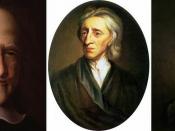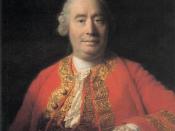Nicolo Machiavelli: Basic nature of man- believes it is better to be feared then loved. He believed that we should be avoid being hated. People more quickly forget the death of their father, than the loss of their inheritance.
Purpose and aim of state- believes virtues can lead to ones construction, whereas some vices allow one to strive. Virtues, which we commonly praise in people, might lead to their downfall.
Structures used to implement the state- believe best to have a reputation of being generous, if generosity is done in secret. Believes those two types of principal government's monarchies and republics.
Use in role of law- he became an important diplomat when the Medici family regained power in 1512.
Moral or Philosophical Ends To Be Achieved- he developed writings of plays that were historical, political philosophy, and even plays. In the end he ultimately gained favor with the Medici family.
His greatest work is the prince written in 1513 published after his death in 1532. Its main theme was that princes should retain absolute control over their territories. His work wasn't taken well and soon condemned by the pope.
John Locke: Basic Nature of Man- man convinces others that a plot of land is his he combines his labor with his plot and this became property.
Purpose and Aim of the State- awareness and reality Structure Used to Implement the State-Locke believes that we can only think about non-mental entities by being aware of mental entities that represent them. In building this relationship he wrote that we must controlled our belief forming capabilities and is our duty to do so.
Use in role of law- Locke's second Treatise of Government a defining work in the soon to merge American Government, was based on Locke's concept of natural law.
Moral or Philosophical Ends To Be Achieved- The hinge of the work was the concept of private property.
Thomas Hobbes: Basic Nature of Man- Hobbes argues that in the absence of social condition every action we perform no mater how charitable or benevolent, it is done for reasons which are self-serving. Says that people are poor, nasty, brutish, and short at best.
Purpose and aim of the state- by the beginning of his residence in Paris 1640 Hobbes had matured the plan for his own philosophical work. It was to consist of three treatises, dealing respectively with matter or body, with human nature, and with society.
Structure used to implement the state- Hobbes draws on the language of the natural law tradition of morality.
Use in role of law- Hobbes studied the law of heresy and wrote a short treatise on the subject providing that there was no court that he could be judged. Argues that monarchy is the best type of government cause a monarch's interests are the same as the people.
Moral or Philosophical Ends To Be Achieved- Sovereign can not be unjust or injure any subject; the sovereign can not be put to death; subject owe him sole loyalty; subjects can not be freed from their obligation; dissenters must consent with the majority in declaring a sovereign; the right to censor doctrines repugnant to peace; legislative power of prescribing rules; judicial power of deciding all controversies; make war and peace with other nations; choose counselors; power of reward and punishment; power of all civil appointments including the militia.
Jean-Jacques Rousseau- Basic Nature of Man- said that man is essentially good, a noble savage when in state of nature, and that good people are made unhappy and crupted by their experiences in society. Purpose and Aim of State- he argued that the goal of government should be to secure freedom, equality, and justice for all within the state, regardless of the will of majority. Structure used to implement the State- Rousseau's political philosophy is that politics and morality should not be seperated. When a state fails in a moral fashion, it ceases to function in the proper manor in ceases to exert genuine authority over the individual. The second most important principal is freedom, which the state is created to preserve.
Use in role of law- argued that the advancement of art and science had not been beneficial to mankind. He proposed that the progress of knowledge had made governments more powerful, and crushed individual liberty. He concluded that material progress had actually undermined the possibility of sincere friendship, replacing it with jealousy, fear and suspicion. Moral or Philosophical Ends to be Achieved- Rousseau's ideas about education have profoundly influenced modern educational theory. He minimizes the importance of book learning, and recommends that a child's emotions should be educated before his reason. He placed a special emphasis on learning by experience.
David Hume- Basic Nature of Man-Believed humans had passion, free-will and morality, offering original and often skeptical appraisals of these notions.
Purpose and Aim of State-By the end of the century, Hume was recognized as the founder of the moral theory of Utility. Utilitarian political theorist, Jeremy Bentham, acknowledges Hume's direct influence on him. Hume's Political Discourses drew immediate praise and influenced economic thinkers such as Adam Smith, Godwin and Thomas Malthus.
Structures Used to Implement the State-Hume was a candidate for the Chair of Moral Philosophy at the University of Edinburgh. The position was to vacated by John Pringle and leading candidates were Hume and William Cleghorn. The Edinburgh Town Counsel was responsible for electing the replacement. Critics opposed Hume by condemning his anti-religious writings.
Use in Role of Law-Hume attacks the character of the clergy, accusing this profession of being motivated by ambition, conceit and revenge.
Moral or Philosophical Ends to Be Achieved-Hume offered Rousseau refuge in England and secured him a government pension. In England, Rousseau became suspicious of plots, and publicly charged Hume with conspiring to ruin his character under the appearance of helping him. Hume published a pamphlet defending his actions and was exonerated. His remaining years were spent refining and revising his published works, and socializing with friends in Edinburgh's intellectual circles. After his death, Hume's name took new significance as several of his previously unpublished works appeared.


